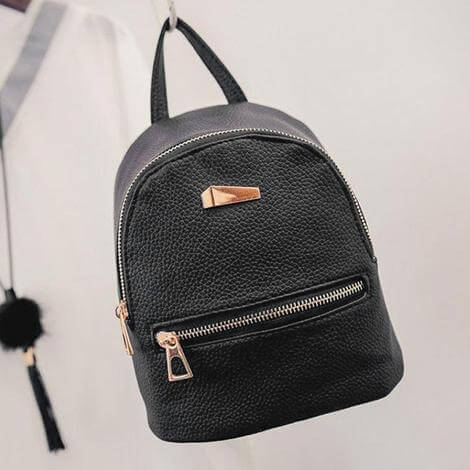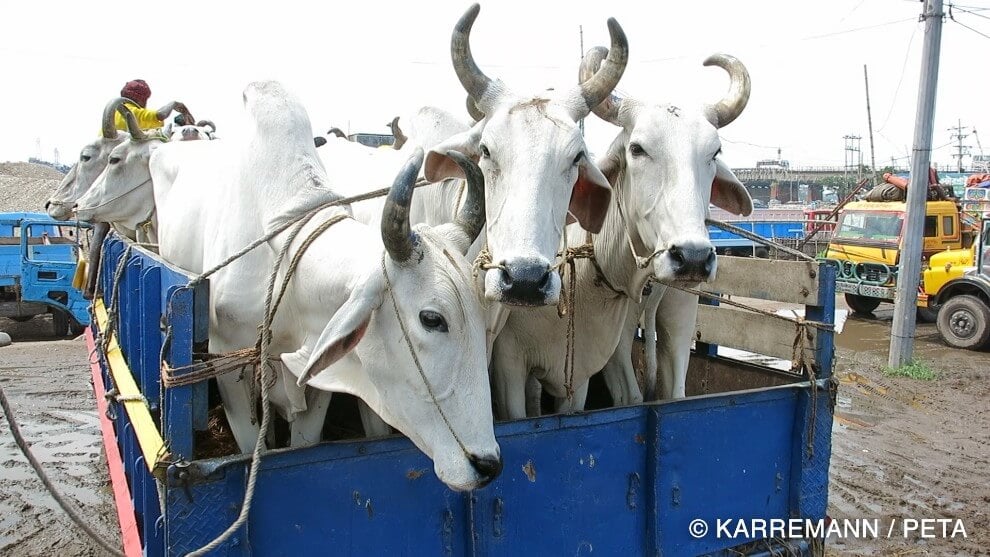Gloves, handbags, wallets, watches, you name it: There’s a laundry list of accessories that have traditionally been made from leather—yes, the unfortunate kind that was originally the skin of an animal. And as PETA’s shocking dog-leather investigation demonstrates, this could mean a lifetime of misery for animals just like the ones we share our homes with, not to mention indicating trouble for the environment, considering the huge amounts of feed, pastureland, water, and fossil fuels required to turn animal skins into accessories. Thankfully, the fashion industry is being redefined with sustainable vegan leather options that will replace cow and dog skin permanently.
Check out this list of vegan leather materials that are as chic as they are kind to animals and the planet:
Banbū Leather
von Holzhausen is determined to make animal-derived leather extinct, and thanks to a team of creative innovators, bamboo-based Banbū Leather was born. Known for its strength and resilience, bamboo is one of the fastest-growing plants on the planet. It can be harvested without destroying its root systems and needs relatively little water to grow. Plus, this material is soft, durable, biodegradable, and high-performing.
Nopal Cacti
Mexican company Adriano Di Marti, created by innovators Adrián Arriaga López Velarde and Marte Cázarez, developed a vegan leather called Desserto, which is made from nopal cacti. Also known as “prickly pear” cactus, these plants, which require very little water, grow easily in various climate zones throughout North America. In addition to being sustainable and animal-friendly, “PETA-Approved Vegan” Desserto leather is easy to clean and breathable, and it doesn’t have to be processed with toxic chemicals the way animal skins do. PETA gave Adriano Di Marti a Compassionate Business Award for stepping up to meet the rapidly growing demand for ethical and eco-friendly vegan leather.
Corn
Multiple companies are turning to corn waste as a new source of leather and suede. Several brands, such as Miomojo, already sell merchandise made with this animal-free and environmentally friendly material.
Banana Leather
Banana leather is made from fibers of the banana plant stem that would normally be discarded. When fashioned into a leather-like material, it becomes super-durable and waterproof while remaining biodegradable.
Pineapple
BOSS Menswear now offers high-quality vegan shoes made of pineapple leather—yep, you read that right: pineapple leather. The material, known as Piñatex, is “an innovative leather-alternative created from pineapple leaf fibres.” Because the leaves are a byproduct of harvesting the fruit, no additional resources are needed to produce the material, which means that farmers receive an additional source of income.
Apples
Leap by Beyond Leather creates apple leather, a sustainable material that is also edible and 100 percent biodegradable. Also check Ashoko Paris for more gorgeous, fruit-derived, sustainable purses.
Grapes
Vegea, an Italian company that specializes in creating sustainable fabrics, has developed a vegan leather made from grapes that’s already grabbed the interest of luxury brands. The company has teamed up with Italian wineries to convert the waste left over from wine production into a high-quality vegan leather that’s available in many different colors. Bentley is even using the grape leather to line the interior of its 100th anniversary car.
Mushrooms
The extraordinary mushroom can be used for so many things, and now, it’s been made to mimic the texture of leather made from animals. MuSkin is made from mushroom caps and tanned with nontoxic ingredients, unlike leather made from the skin of cows or other animals. The new biodegradable material is softer, more breathable, and more water repellent than leather derived from animals—perfect for everyday items such as belts, purses, and shoe soles. It’s not just mushroom caps that can be used to make great, eco-friendly vegan leather. Mylo, a material developed by Bolt Threads, is created from the underground root structure of mushrooms and is soft, durable, and sustainably made.
Mulberry Tree Leaves
MulbTex is a new material made from the paper pulp of mulberry tree leaves, which is used to coat cotton canvas and glazed with tree sap to make it water resistant. One of our favorite handbag brands, Gunas, currently holds exclusive rights to MulbTex in the U.S. and has launched this innovative material with a collection of handbags. Swoon.
Teak Leaf
Teak leaf leather is lightweight, durable, water-resistant, anti-fungal, and environmentally friendly. In a process inspired by the traditional handmade one from Thailand, the teak leaves are harvested from fallen leaves, soaked in water, dyed, and then arranged flat together and set out to dry. The end result provides large sheets of leaf leather that can be sewn to make any clothing item or accessory imaginable, like the humane and sustainable teak leaf leather handbags from GnL Accessories.
Classic Polyurethane
This traditional variation on vegan leather is a resilient, flexible, and durable fabric that can be molded into a variety of goods. Although not as sustainable as the aforementioned materials, this synthetic fabric doesn’t do half the damage caused by the leather industry.

Paper, Wood, and Cork
Nothing says sustainable, luxury style like wearing trees. The use of reclaimed wood and cork oak (made of water-resistant cells on the outer bark of cork oak trees that naturally grow back) makes these products that much more appealing and helps the planet, too.
Upcycled Coffee Grounds and Plastic Bottles
German sneaker company nat-2 loves proving that you can make classy shoes in innovative ways. Its coffee line uses recycled coffee grounds and plastic bottles to create a luxe material that looks like suede, and it has also made shoes from stone, grass, corn, beans, and other materials.
Coconut Water
New fashion brand Malai Design & Materials uses bacterial cellulose derived from coconut water to create a leather-like material. This water is usually discarded from a factory in Kerala, India, but product designers Susmith C. Suseelan and Zuzana Gombosova think that sustainable vegan leather made from such sources needs to become the market standard. “Nobody thinks of the harm done to the environment and the number of animals [who] are slaughtered in the process,” Suseelan told an Indian newspaper. “It’s high time that an eco-friendly substitute for leather is introduced in the market.”
In Development
Keep an eye out for these other companies that are developing new vegan leather options. We’ll have updates here when their products become available for purchase.
Olives
Olives are no longer just delicious snacks. Oleatex is using material left over from the olive industry to create vegan leather that’s sustainable, stylish, and even recyclable.
Sugarcane
Plant-based textile company BeWave is creating a number of fabrics from food waste, including sustainable leather made from sugarcane.
Tea Waste
Wastea uses waste from the tea industry that’s otherwise unusable to craft a vegan and sustainable option instead of leather made of animal skin.
Flowers
Fleather is an innovative, eco-friendly material made through a process called “flower cycling.” The company that developed it, Kanpur Flowercycling Private Limited, collects flower waste from Indian temples and repurposes it as a leather-like material that can be used in a variety of garments. Although Fleather is not yet commercially available, Kanpur Flowercycling has teamed up with three luxury fashion brands that are developing fashion lines with it. The city of Kanpur is known as a major producer of leather made from animal skin, so Kanpur Flowercycling is truly at the forefront of the shift toward animal- and eco-friendly leather, which is why PETA India gave it an award for Best Innovation in Vegan Fashion during Lakmé Fashion Week.
Yeast
Zoa leather, developed by biofabrication company Modern Meadow, is a material made from proteins and collagens obtained from the same yeast that’s used to make beer. The process is completely animal-free and results in a liquid that can be formed into a variety of textures, shapes, and thicknesses. It’s not yet commercially available, but the company expects to perfect its process in the next few years.
Green Tea Leather
A research team at Auburn University in Alabama discovered that a material derived from green tea has properties at the cellular level similar to those of leather. When layered with other sustainable fabrics such as hemp, it becomes a strong, breathable, and biodegradable material. Although it’s still under development, the team made prototype shoes out of the green tea leather, which testers reported was more comfortable and flexible than animal leather.
Peruvian Plants and Fruits
Le Qara makes 100% biodegradable “lab leather” out of microorganisms derived from exotic flowers and fruits native to Peru. Watch the short video below to learn more:
Kombucha Tea
It’s no longer just your go-to healthy brunch drink. Researchers at Iowa State University and others have actually been using kombucha tea to make vegan leather, affectionately calling it “teather.” Although they are still testing the material they’ve made from harvesting fibers from a kombucha-based mixture, we can’t wait to see what kombucha pieces will be lining the runways soon.
Soy
Women from XXLab in Yogyakarta, Indonesia, are creating a new soy leather made from the liquid runoff of tofu production. This low-cost, zero-waste fabric has been used to make shoes, purses, and wallets. The promising new leather-like material has not become available to the public yet, but we look forward to seeing the results of XXLab’s fascinating project.
Fruit Waste
A design duo in Rotterdam is currently developing a vegan leather to help solve the world’s food waste problem. Fruitleather Rotterdam‘s website explains that they are busy “developing a new, eco-friendly process that converts leftover fruits into a durable leather-like material. The material is being further developed so that it will be strong enough to be used for shoes, handbags and other products in the future.”
Text VEG to 73822 to get the latest vegan lifestyle tips, recipes, and urgent action alerts texted right to your phone.
Terms for automated texts/calls from PETA: https://peta.vg/txt. Text STOP to end, HELP for more info. Msg/data rates may apply. U.S. only.



